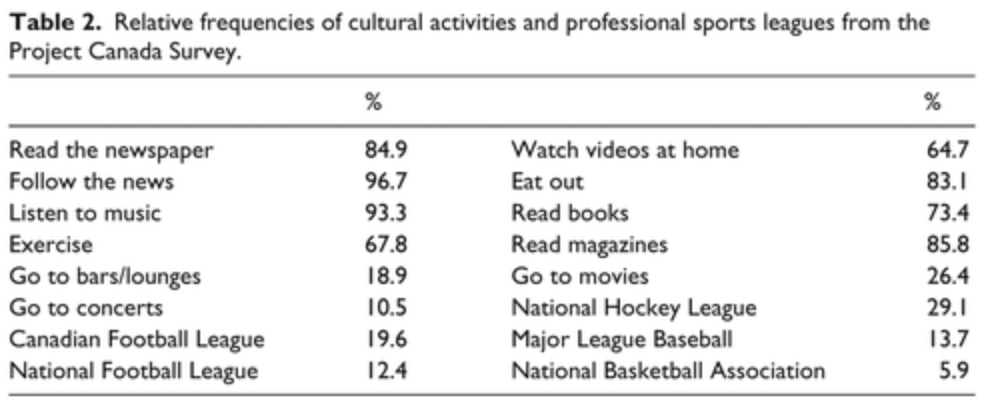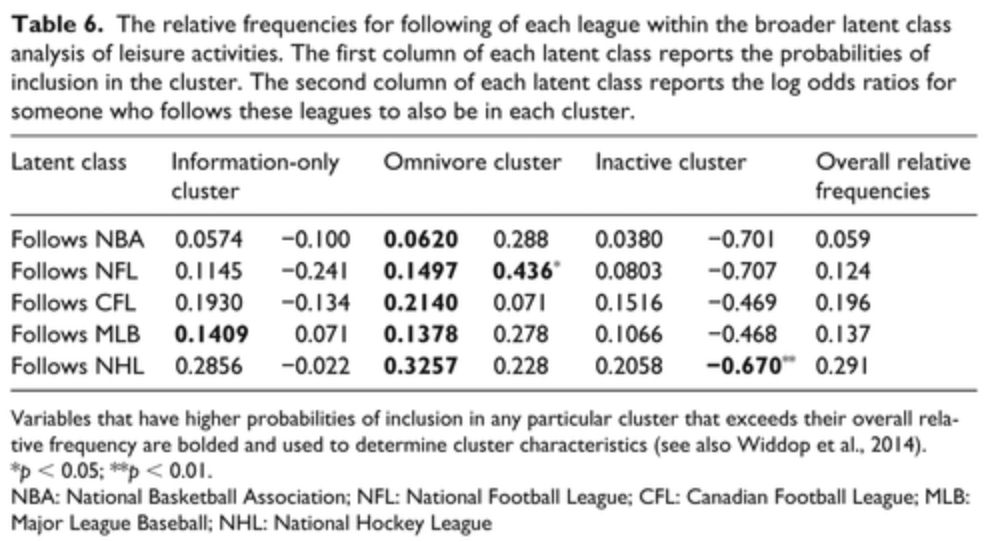Researchers: Canadian sports fans come from similar cultural backgrounds

Canadian sports fans tend to be more educated, have a higher economic and cultural background as well as more socially engaging. A new study categorized Canadian sports fans with these traits as cultural “omnivores” and individuals who are more likely to be the main consumers of sports in Canada.

The Project Canada Survey led by Adam Gemar looked into the types of leisure activities consumed by Canadians because “there generally exists a lack of scholarship on sport consumption in the context of Canada.”
However, when looking at the cultural makeup of people, “sporting viewership is arguably a better representation of an individual’s cultural profile because it is an activity in which more people participate.”
The survey paper issued by the Project Canada Survey used a sample size of 2,400 Canadians and recorded their age, gender, location (urban or rural) and economic status as well as what kind of leisure activities an individual participated in.
Researchers categorized individuals into three clusters; the “omnivores” defined as people who participate in a variety of activities; “information-only,” defined as people who read books and magazines, and are only partially-inclusive to engagement; and “inactives” that tend to stay away from public forums and social engagement.
The omnivore cluster consists of individuals who are more educated, have a higher economic background, are around the median age of 30-59 years of age who enjoy leisure activities across the board. Compared to the other two clusters, cultural omnivores typically balance their leisure activities rather than committing to one hobby/habit as is the case in the information-only and inactive clusters.
The “information-only” cluster typically consists of individuals with lower levels of education, from smaller towns and skew older on average than the other two clusters. “Information-only” voters typically choose an indoor lifestyle. Individuals listed in the "inactive" cluster were found to be the least educated and had the lowest average household income. Individuals in this group are the least likely to follow professional sports.

Among those surveyed, roughly 29.1 percent watch the NHL, 19.6 watch the Canadian Football League, 12.4 watch the NFL, 13.7 watch Major League Baseball, and 5.9 percent watch the NBA. The omnivore cluster were found to be the top consumer for all sports leagues while the “information-only” and “inactive” clusters showed a significantly lower turnout. The study showed the “information-only” group favored baseball (specifically MLB) and the “inactive”cluster” had a small following for the NHL.
Outlets such as fantasy sports, sports gambling and online streaming have increased the ways people follow their sport. However, in Canada, “the conception of the professional sports follower is not a period-specific activity” and those who used to listen to a game on the radio or read a recap in the newspaper will shift followers toward online content.

Currently, four of the five top sports leagues in the world exist in North America (basketball, football, baseball and hockey), and Canada has nine franchises in those leagues (one MLB, one NBA and seven NHL) that generate roughly $8 billion U.S. dollars and account for around 105,000 Canadian jobs. Major League Soccer expanded into Canada in 2007 adding to potential viewership.
"Given the pervasiveness of professional sports in today’s societies, more surveys should include information on sport into their questions on culture and leisure. These are the further paths of investigation into a domain of culture that is too large to be further neglected,” according to the study.
Tyler Dare is a senior journalism student at Arizona State University.


